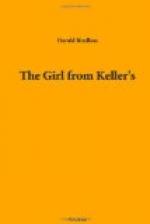Sitting down, he began with methodical patience to turn over the snow and loose rubble that remained on the shelf after the large stones had fallen. The odds were against his finding what he sought, but he persevered for an hour and then picked up a piece of broken metal a few inches long. It was half of the wedge, which had broken at the slot, but although he searched carefully he could not find the other part. Putting the piece in his pocket, he went to the forge and, seeing the smith was occupied, sat down and filled his pipe. The door was open and the light reflected from the snow was strong. Charnock was glad of this, because he wanted to see the smith, who presently dropped his hammer and leaned against the hearth.
“How’s your partner getting on?” he asked. “Mr. Festing’s the kind of man I like; I was sorry to hear he had got hurt.”
Charnock studied the man. His face was pale and wrinkled under the grime, but he looked honest, and if his statement was sincere, as Charnock thought, it seemed to clear the ground. After giving him a few particulars about Festing’s injuries, he lighted his pipe.
“Wilkinson’s not here to-day,” he remarked.
“He’s not always here,” said the smith. “He comes when there are picks and drills that want sharpening.”
“I saw him once or twice when I was in, and thought he was a friend of yours.”
“He can swap a good yarn; kind of handy man and sometimes helps me with the hammer, but I guess that’s all there is to it.”
“Just so,” said Charnock carelessly. “This is a warm place for a quiet smoke, and the foreman can’t tell how long one ought to stop, particularly as you’re sometimes out at the machine-shop. Do you find the boys meddle with your tools if they come in while you’re away?”
“No, sir; there’d be trouble if I did! Besides, nobody comes but Wilkinson, and if I’m out he waits.”
Charnock nodded, as if it did not matter. He had found out what he wanted to know and thought he had not excited the smith’s suspicions. Taking the broken wedge from his pocket, he put it on the hearth.
“I expect you know what that is! The Lewis smashed when the frame came down.”
“It’s the wedge. Don’t see why it broke; plenty metal left, though the slot weakened it.”
“What’s it made of?”
“Steel. The iron I wanted didn’t come; but this is mild, low-carbon stuff.”
“Then what’s the matter with it. It did break.”
The smith put the piece into a socket in the anvil and struck it with a hammer. The end broke short, and picking up the fragment he went to the door.
“Nature’s gone out of it; I sure can’t understand the thing,” he said with a puzzled look. “If I hadn’t forged the stuff myself, I’d allow it was burned.”
“You don’t often overheat the steel you work.”
“No, sir,” said the smith, who took up a piece of metal, pierced with holes. “Made this out of the same bar, and it took more forging. Now you watch!”




